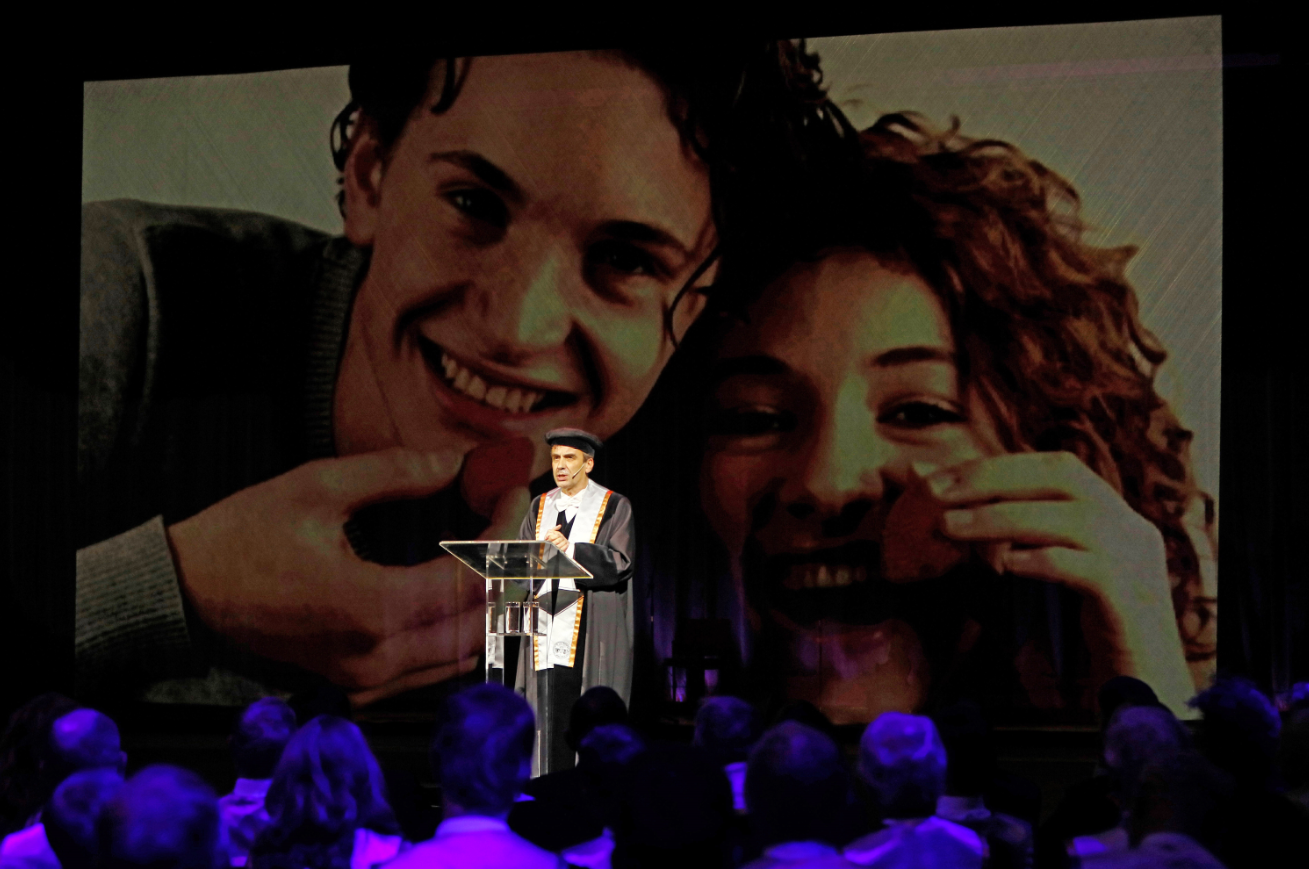Teslas, vegan burgers and democracy
“We must design things that provide short-term pleasure and long-term benefit for health, animal welfare and the planet”, argued Professor Paul Hekkert at the 178th Dies Natalis.
In line with tradition, TU Delft used its anniversary to announce the theme for the year: Design for Values. Prof. Paul Hekkert (Faculty of Industrial Design Engineering) interprets that as “targeted design aimed at achieving or facilitating certain values”.
Designers are used to such values as beauty, pleasure and ease of use. But sustainability, healthy living and social cohesion are now often the values that matter. Although the traditional values sell themselves because they are attractive, does that also apply to the new values?
“A shift is happening from values in which you have a direct interest towards collective long-term values”, explains Hekkert. “That's what we stand for in all the social transitions: energy transition, healthy living and nutrition. It is the designer’s role to ensure that long-term goals can automatically merge with the short-term objectives.”
Hekkert cites the electric car as an example. “A Tesla is a good product because it’s a coveted possession and good for the environment. The same applies to the Beyond Burger, a vegan burger that tastes as good as a real hamburger, but contains no meat. We must design things that provide short-term pleasure and long-term benefit for health, animal welfare and the planet. Reconciling interests in products and services – that’s what we need to aim for.”
Honorary doctors
As part of this process of combining attractiveness and sustainability, TU Delft has appointed two honorary doctors to serve as role models: Professor Batya Friedman (Washington University) and Dr Marco Steinberg (Helsinki).
Professor Batya Friedman founded the Value Sensitive Design Lab. In the early 1990s, she studied human-computer interaction. That also marked the start of value sensitive design, in which she made her name. The design method is now used in hydraulic engineering, self-driving cars and AI.
Friedman was nominated by Prof. Ibo van der Poel (Faculty of Technology, Policy and Management). “In value sensitive design, values are made explicit and approached systematically”, he explains. “This primarily involves non-functional qualities, such a safety, sustainability, privacy and fairness. These are separate from the question of whether a design actually works.”
According to Van de Poel, Friedman’s method provides a technique for taking values into account in a process of technological development.
Marco Steinberg, the other honorary doctor, made his name as director of the Finnish innovation platform Sitra and founder of the Helsinki Design Lab. Since 2013 Steinberg has been based at his own consultancy firm Snowcone & Haystack and also shares his office with the former Finnish prime minister Esko Aho.
“Steinberg focuses on institutions and systems”, explains Hekkert who nominated him. “What changes need to be made to our institutions and political, legislative and executive powers in order to make changes possible? Engineers can design electric cars, but infrastructure, regulations, subsidies and everything that surrounds them also have to be coordinated to ensure people do the right thing in the long term. All kinds of things need to change at system level for that to happen. That's Marco’s area.”
So Steinberg focuses on institutions and systems and Friedman on method and strategy. Designers work in the area between them in order to design things that need to be attractive, also for the longer term.
Democratic values
TPM Professor of Ethics, Dr Jeroen van den Hoven, also director of the Delft Design for Values (DDfV) institute, goes even further than attractive and responsible products and institutional changes. He believes that democracy itself needs to be redesigned if we wish to preserve it. At a workshop in the European Parliament (November 2018), he talked of the modern threats to democracy: micro-targeting, botnets, fake accounts and recommendation systems that keep people in a bubble.
The Cambridge Analytica company, for example, has repeatedly used such techniques to influence elections. “A combination of behavioural sciences, AI and big data are undermining human autonomy and self-determination”, argues Van den Hoven. “And the worst thing is: it is all for sale.”
The European Parliament organised a workshop to examine the use and abuse of technology in election campaigns. Van den Hoven ended with a powerful appeal: “We need to ensure that democracy can withstand undemocratic tendencies and implement our ideals and ideas technologically or else we will lose them completely. The European Commission and the European Parliament need to set to work quickly on a European design for an online democratic initiative.”
Closer to home, his faculty, TPM, had already been experimenting with an online debating platform MOOD (massive open online deliberation). One thousand Rotterdam citizens were able to share ideas online with each other and the mayor about the future of their city and country. It is one of the attempts to maintain democracy in a time of digital trickery and deception.
This is not a new endeavour. Van den Hoven quoted the American philosopher John Dewey (1859 - 1952) who said that democracy should be reinvented every day. “In our age of big data and AI, we also need to design for it – every single day.”
This primarily involves non-functional qualities, such a safety, sustainability, privacy and fairness.
